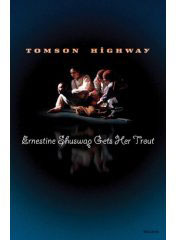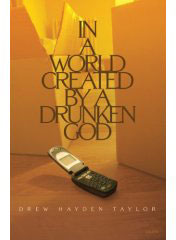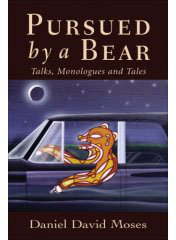Ernestine Shuswap Gets Her Trout

by Tomson Highway
93 pages,
ISBN: 0889225257
In a World Created by a Drunken God

by Drew Hayden Taylor
127 pages,
ISBN: 0889225370
Pursued by a Bear: Talks, Monologues and Tales

by Daniel David Moses
ISBN: 1550966464
Post Your Opinion | | Theatre
by Martin Morrow
WORKS OF NATIVE WIT
I can never see or read a play by Canadian Cree dramatist Tomson Highway without thinking of the Russian master Nikolai Gogol. Not the Gogol of The Inspector General and "The Overcoat", necessarily, but the one who penned inimitable folk tales like "The Story of How Ivan Ivanovich Quarrelled with Ivan Nikiforovich"¨simultaneously one of the funniest and one of the saddest stories ever written. Like Gogol, Highway creates broad comic characters with super-sized personalities, and his writing is just as likely to begin with a belly laugh and end with a sob.
Ernestine Shuswap Gets Her Trout, originally produced in 2004 by the Western Canada Theatre of Kamloops, B.C., is a historical play about the grievances of the indigenous people of the Thompson River Valley, as laid out in a deposition presented by their chiefs to Prime Minister Sir Wilfrid Laurier in 1910. Nothing funny about that, and yet Highway's tone, right up until the end, is frequently hilarious. He approaches the subject via four First Nations women of various ages who are preparing the banquet to accompany the "Great Big Kahoona's" (Laurier's) visit to Kamloops¨a quartet of bickering, bantering females who might well be ancestors to the characters of Highway's landmark play The Rez Sisters. And he gives the story a fresh, contemporary feel by rendering the women's Shuswap dialogue in a colloquial, often anachronistic modern English that can be by turns garrulous, eloquent, or playfully ribald (much is made of the Big Kahoona being served a flesh-and-fowl dinner of "beaver and tits").
Highway uses comedy as leavening for this sadly familiar tale of stolen land, with the steady encroachment of English settlers upon rivers, pastures and mountains becoming almost a running gag. In the end, however, tragedy wins out: revelations of racial hatred and violence surface; the youngest of the women, mentally unstable, seeks to abort the half-white child she is carrying; and the recited text of the chiefs' litany of grievances, the Laurier Memorial, begins to supplant the boisterous mood. Still, the play closes on a defiant note¨with a sense of aboriginal resilience and endurance, due no doubt in part to that ability to laugh in the face of woe.
Drew Hayden Taylor suggested that comedy is part of the First Nations survival kit in Me Funny, his recent anthology of aboriginal humour (which included a contribution by Highway). However, in Taylor's latest play you won't find any of those Highway-style high spirits, just bitter irony. A World Created by a Drunken God is a drama about Jason, a young Canadian man, half Ojibwa (like the playwright), who is preparing to move from Toronto back home to his mother's reserve when he's confronted by Harry, a non-aboriginal American who claims to be his half-brother. Harry has shown up on Jason's doorstep because their father¨whom Jason has never known¨needs a kidney transplant and his family can't find a compatible donor.
Understandably, Jason is reluctant to spare a vital organ for the man who abandoned him and his mother when he was still an infant, and has never attempted contact again until now. Harry, however, is desperate to save his father and won't be put off easily. Taylor takes what is already a major dilemma¨can an adult child forgive a parent who deserted him?¨and ups the stakes by having that parent also represent the traditional aboriginal enemy, a well-heeled white American, one who is requesting not merely forgiveness, but a sacrifice.
Although it's a two-hander, the play pretty much belongs to Jason, and Taylor gives him a tart wit and all the best lines. Despite attempts to make Harry sympathetic and show his love for his father, the character's main function is that of a foil to Jason or, at best, a goad, making Jason recognize his own anger and fear of commitment¨symptoms of that long-ago abandonment. By the time Harry finally leaves, Jason's glib fatade of indifference to his father has come crumbling down.
Taylor and Highway are arguably Canada's most prominent First Nations playwrights, but if you need a third to make a triumvirate, there's Daniel David Moses. Moses, of Delaware First Nations (from Ontario's Six Nations), is the most ambitious of the three in the spectrum of his dramatic writing, with works ranging from the contemporary, urban Coyote City to the historical Brebeuf's Ghost and the "syphilitic western" The Indian Medicine Shows¨the latter anticipating the gay cowboys of Brokeback Mountain by a decade. He's also given to plenty of introspection about his role as an aboriginal writer, to judge from Pursued by a Bear, his collection of essays and speeches on his work and that of others.
In these 18 pieces, Moses muses on everything from the writings of fellow Canadian poets Pauline Johnson and Gwendolyn MacEwan to the musical Oklahoma!, but he's most fascinating when tracing his own writing impulses, particularly in a longer essay plumbing the subconscious origins of the two-part Indian Medicine Shows, or, as he calls it, "my first play with white characters." These pieces were composed for different audiences and readers over more than a decade, so there's some needless repetition of facts and anecdotes, but taken as a whole they chart the artistic growth of a First Nations poet-playwright trying to reconcile the tenets of western European literature with the teachings of native culture. And yes, like Highway and Taylor, he's often very funny. ˛
Martin Morrow is an award-winning theatre critic and the author of Wild Theatre: The History of One Yellow Rabbit.
|